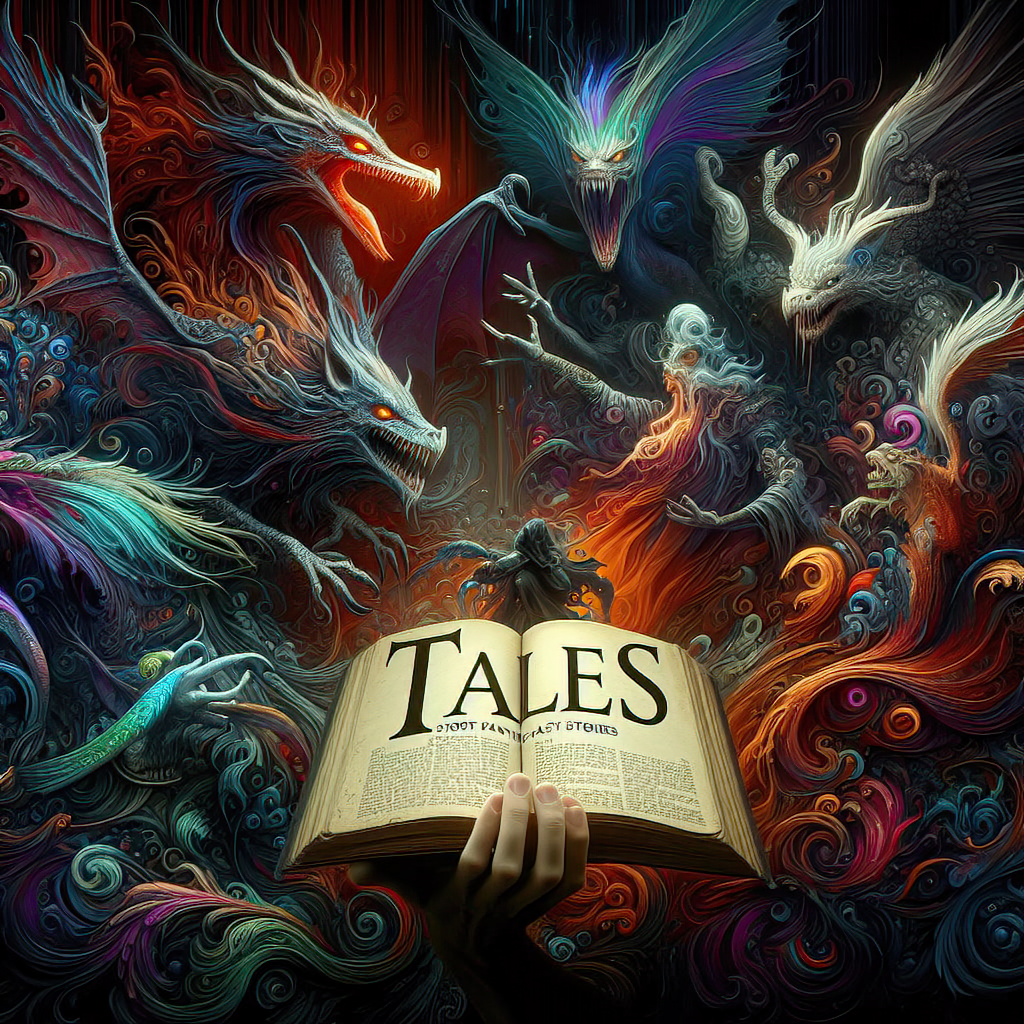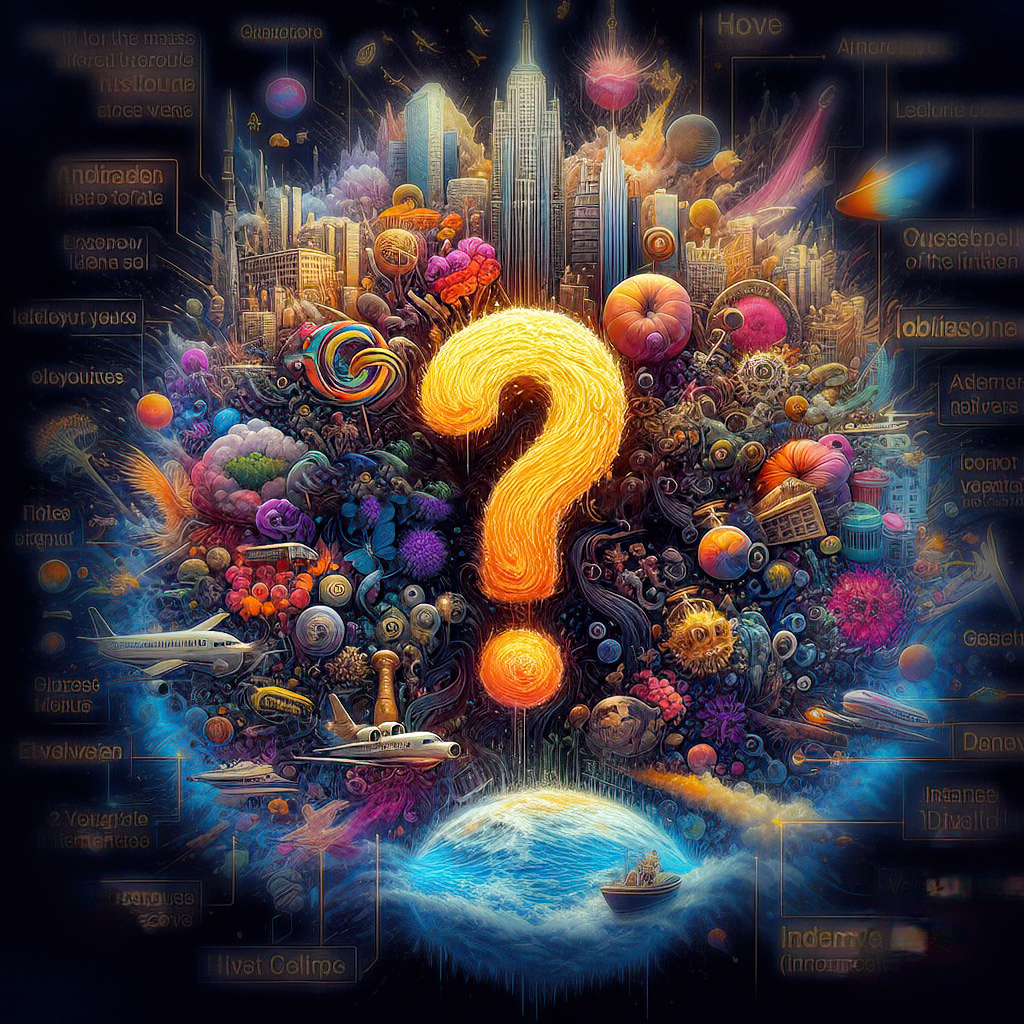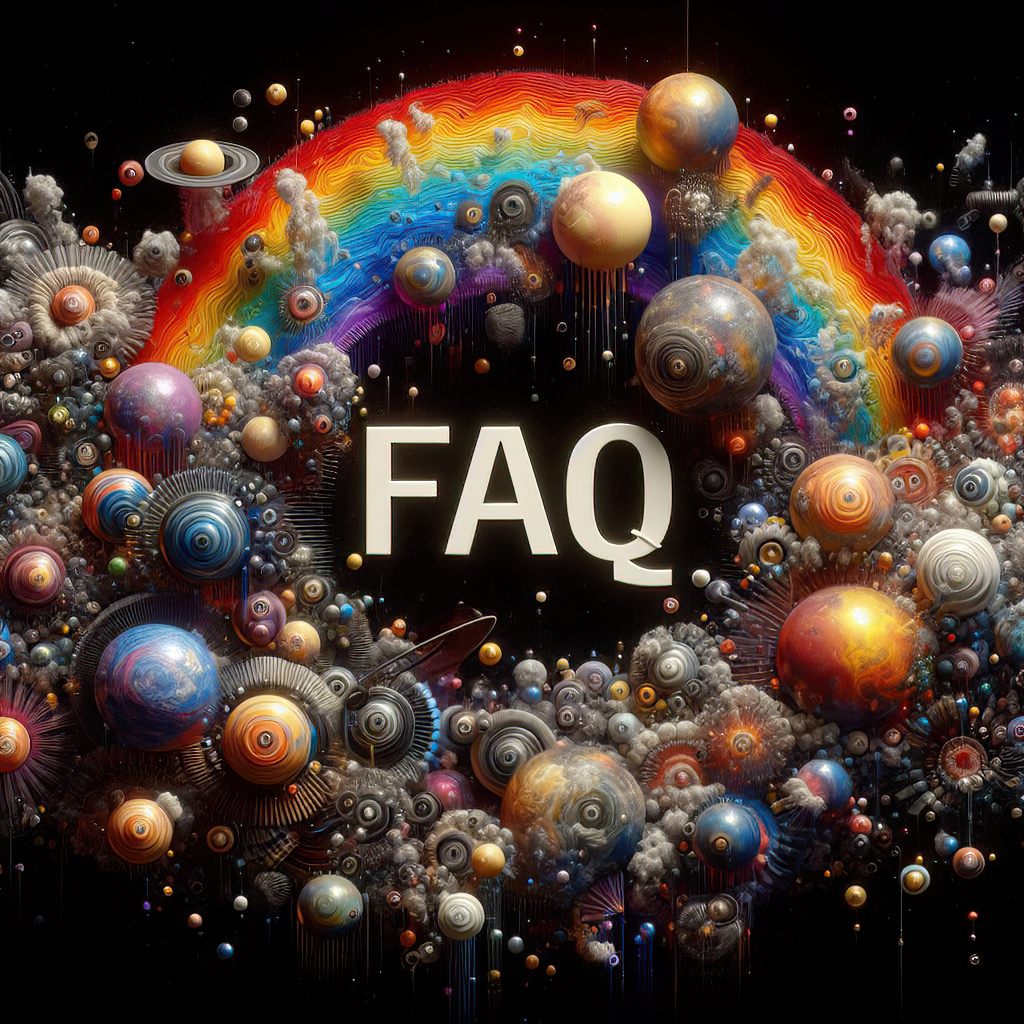por Bill Tiepelman
El duende de la calabaza
El mocoso del parche
La llamaban El Duende Calabaza , aunque si le preguntabas a cualquiera que hubiera soportado su compañía, el término "duende" era demasiado generoso. Se suponía que los duendes eran cosas delicadas y brillantes, travesuras etéreas con una pizca de encanto. Ella no era nada de eso. En cambio, era una tirana diminuta envuelta en mallas a rayas, pisoteando el huerto de calabazas como si lo hubiera heredado de una larga línea de realeza vegetal. Mocosa, duende, niña demonio: esos eran los nombres que susurraban cuando estaba fuera del alcance del oído. Pero "Duende Calabaza" se había quedado, sobre todo porque nadie quería decir los otros títulos en voz alta donde ella pudiera oír y ofenderse. Y oh, ella se ofendió.
Su reino de calabazas se extendía a las afueras del pueblo, donde los campos se hundían en la sombra y la tierra olía a humo y secretos. Vivía dentro de una calabaza ahuecada, absurdamente enorme, gorda, anaranjada y veteada como si la hubieran alimentado a la fuerza con luz de luna. Dentro, la había tallado en una casa torcida: estantes con objetos robados (candelabros, cucharas y al menos tres pares de botas), cortinas cosidas con trapos de espantapájaros y un trono hecho completamente de calabazas apiladas y pegadas con savia pegajosa. Su sentido del diseño de interiores podría describirse como "mercado de pulgas salvaje", pero aun así se sentaba en su trono con la presunción de una monarca, con el sombrero ladeado y la barbilla levantada, desafiando a cualquiera a cuestionar su autoridad.
Cada octubre, se hacía notar. Soplaba el primer viento frío, maduraba la primera calabaza, y salía, chillando como una alma en pena que se hubiera pasado con la sidra. Los aldeanos temían esta temporada, aunque nunca lo admitirían en voz alta, porque admitir el miedo le daba fuerzas. Y fuerzas que no necesitaba. Entraba pavoneándose en el pueblo con botas varias tallas más grandes, robadas a un zapatero remendón que aún se quejaba del robo, pero no se había atrevido a pedirlas. Su llegada siempre era anunciada por un cuervo que volaba delante de ella, graznando como si anunciara: «¡Viene la mocosa! ¡Prepárense!».
Su reputación se había ganado a lo largo de los años por lo que generosamente podríamos llamar "travesuras", aunque una palabra más precisa habría sido "crímenes". Una vez pintó caras en fardos de heno de forma tan convincente que un granjero casi se desmaya al pensar que la paja lo observaba mientras se desvestía. En otra ocasión, reorganizó toda una cosecha de calabazas en formas toscas que ningún aldeano decente reconocería, pero todos se sonrojaron al verlas. Encerró a las gallinas de un hombre en su letrina durante tres días, y cuando finalmente abrió la puerta, casi lo picotearon hasta la muerte unas gallinas furiosas con un nuevo afán de venganza. El Duende afirmó que era "arte". Los aldeanos lo llamaron "motivo de exorcismo".
Pero lo que más ponía nerviosa a la gente no eran las bromas de la niña. Era cómo ocurrían las cosas raras cuando cambiaba de humor. Si reía —de verdad reía, con ese sonido salvaje, estridente y erizado—, las calabazas talladas para la víspera de Todos los Santos parpadeaban al unísono, como si se inclinaran ante su humor. Si hacía pucheros, el viento se arreciaba lo suficiente como para quemarte las mejillas, y la escarcha se colaba por las ventanas en delicados patrones que sospechosamente parecían gestos groseros. Y si alguna vez susurraba tu nombre —suave, casi dulce—, por la mañana encontrarías enredaderas de calabaza trepando por tu puerta, hojas apretadas contra tu puerta como dedos verdes ansiosos por entrar. Algunos afirmaban que las enredaderas incluso probaban el pomo de la puerta, retorciéndose, tirando, probando. Pero, por supuesto, nadie quería confirmarlo.
Así que los aldeanos la toleraban. Era mejor fingir que sus travesuras eran divertidas que arriesgarse a su ira. Era mejor reírse nerviosamente cuando gritaba "¡Inclinaos, campesinos!" desde lo alto de un tocón, que llamarla una plaga en su cara. Incluso los animales habían aprendido sus estrategias. Los mapaches sonreían cortésmente cuando exigía cumplidos. Los cuervos ponían los ojos en blanco solo cuando no los miraba. Y los espantapájaros, cosidos con sonrisas que parecían demasiado amplias, murmuraban en voz baja cuando pasaba. "Aquí vamos otra vez", se oyó gruñir a un espantapájaros, con su mandíbula de paja crujiendo siniestramente. Pero los espantapájaros nunca lo decían demasiado alto, porque corrían rumores de que ni siquiera ellos eran inmunes a sus cambios de humor.
El Duende Calabaza se alimentaba de la atención, y hacía casi cualquier cosa para conseguirla. Una vez organizó una elaborada "coronación" en medio de la plaza del mercado, envolviéndose en una capa robada del coro de la iglesia, con una corona de tallos de calabaza balanceándose precariamente sobre su cabeza. "¡Inclínense ante su Reina Calabaza!", chilló, blandiendo un cetro hecho con un palo de escoba y coronado con una calabaza. Los aldeanos aplaudieron torpemente, intentando sonreír mientras exigía el pago de impuestos en forma de caramelos de maíz. Cuando la esposa del panadero se negó, sus panes de masa madre se levantaron a la mañana siguiente con caritas burlonas, sonriendo con suficiencia a todo el que intentaba cortarlos.
En el fondo, nadie creía que fuera solo una niña. Había algo más viejo en ella, algo salvaje y ancestral, escondido tras esa sonrisa malcriada. ¿Por qué las calabazas siempre parecían crecer de forma anormal en su presencia? ¿Por qué las enredaderas parecían retorcerse hacia sus tobillos como mascotas ansiosas? Y lo más inquietante de todo: ¿por qué nadie recordaba un tiempo antes de que apareciera en la aldea? Algunos susurraban que nació de la primera semilla maldita plantada en el huerto, que cobró vida como un hongo al que se le da forma. Otros afirmaban que era hija de una bruja que había alimentado su jardín con demasiada sangre. Pero nadie se atrevía a preguntarle directamente, a menos que quisieran enredaderas en la puerta y susurros en sus sueños.
Aun así, la vida seguía. Los aldeanos soportaban su reinado de octubre como se soporta un dolor de muelas: constante, doloroso, pero más fácil de ignorar que de afrontar. Y el Duende Calabaza lo disfrutaba, pavoneándose por los campos, lanzando maíz dulce al barro, cacareando cuando los cerdos se apresuraban a comérselo. Era malcriada, insoportable, terriblemente poderosa. Y mientras la luna se alzaba sobre el torcido huerto de calabazas, iluminando su trono naranja y su sonrisa torcida, susurró una promesa a nadie en particular: «Este año... ay, este año será delicioso».
Trucos, tratos y tiranía
Para la segunda semana de octubre, el Duende Calabaza se había aburrido de sus tonterías habituales. ¿Reorganizar calabazas en formas groseras? Listo. ¿Pintar caras presumidas en fardos de heno? Viejas noticias. ¿Encerrar gallinas en la letrina? Clásico, sí, pero en última instancia, aburrido. No, este año, quería más. Risas más grandes, gritos más fuertes y un escenario digno de su pequeño ego de niña. Las travesuras estaban bien, pero ansiaba teatralidad . Quería que los aldeanos se despertaran cada mañana aterrorizados, susurrando: "¿Qué va a hacer esa niña ahora?", como si fuera un desastre natural con patas.
Su campaña de caos comenzó de forma sutil. El panadero se despertó una madrugada y encontró su horno rugiendo, pero todos los panes que contenía habían sido reemplazados por calabazas. Calabazas perfectamente horneadas, de piel dorada y humeantes. Cuando abrió una con incredulidad, juró que se rió. Su esposa se negó a comérselas, pero los cerdos se las zamparon y luego empezaron a recitar canciones infantiles con voces escalofriantes durante una semana. El Duendecillo, encaramado en un poste cercano, aplaudió con sus pegajosas manitas y se rió hasta casi caerse.
Luego, atacó al herrero. Se coló en su forja en plena noche, reemplazando sus robustas herramientas de hierro por unas que había tallado en pulpa de calabaza. Imaginen su confusión cuando intentó herrar un caballo, solo para que el martillo se estrellara contra el yunque, convirtiéndolo en una masa anaranjada. El caballo seguía riendo dos días después, o al menos eso le pareció al aprendiz de herrero. El Duende incluso dejó una nota con jugo de calabaza sobre el yunque: «Intenta forjar con sentido del humor, miserable pedazo de carbón. Besos y abrazos, Tu Reina Calabaza».
Los aldeanos le rogaron al sacerdote que interviniera. Encendió velas y roció agua bendita sobre el terreno, pero al regresar a la capilla, todas las velas estaban apagadas y reemplazadas por pequeñas calabazas talladas con expresiones obscenas. Del mismo púlpito brotaron enredaderas que lo envolvían con cariño, apretándose con más fuerza cada vez que intentaba predicar. Al final del sermón, se dio por vencido por completo y anunció que los himnos serían reemplazados por gritos. El Duende Calabaza estaba sentado en el último banco, balanceando las piernas y tarareando, presumido como un gato que se hubiera tragado no solo al canario, sino a todo el coro.
Pero las travesuras por sí solas no eran suficientes para ella este año. No, este octubre quería un festival . Quería una celebración de sí misma, de su malcriada majestad, y si los aldeanos no estaban dispuestos a organizarle un desfile, ella misma haría uno. Y así nació la Gran Procesión de Calabazas. Pasó tres noches en el huerto, ordenando a las enredaderas que se retorcieran en pequeñas criaturas grotescas: linternas de calabaza vivientes con sonrisas torcidas y ojos brillantes. La seguían arrastrando los pies dondequiera que iba, chillando y riendo en voces demasiado bajas para su comodidad. Al principio, los aldeanos asumieron que era solo otra de sus crueles bromas. Pero luego las criaturas calabaza comenzaron a robar cosas: cucharas, sombreros, calcetines, la dentadura postiza de un hombre. Cuando se enfrentaron, el Sprite declaró: "Son mi guardia real. ¡Respeten su pegajosa autoridad!"
Imaginen el horror de despertar y encontrarse con un ejército de soldados calabaza hasta las rodillas pisoteando las calles, exigiendo dulces, sidra o un "aplauso respetuoso". Los aldeanos obedecieron, aplaudiendo mientras estas monstruosidades naranjas marchaban en círculos, tropezando con sus propias enredaderas y, ocasionalmente, estallando en charcos de papilla. El Duende lo tomó como un teatro, haciendo reverencias dramáticas, dando vueltas con sus botas enormes, exigiendo bis tras bis. Habría sido adorable si no fuera porque cada vez que alguien no aplaudía, su puerta estaba estrangulada por las enredaderas por la mañana.
—No puedes seguir así eternamente —murmuró el Viejo Bracken, el único aldeano lo suficientemente valiente —o senil— como para criticarla. Agitó su bastón hacia el lugar donde ella se posaba, observando a su ejército de calabazas pisotear por ahí—. Tarde o temprano se te acabarán las calabazas.
El Duende Calabaza jadeó como si la hubiera insultado personalmente. "¿Que se acabe? ¡¿Que se acabe?! " Se puso de pie de un salto, con las manos en las caderas, y el sombrero casi se le cae. "Viejo, ¿me crees una simple consumidora de calabazas? ¿Una usuaria de calabazas? ¡ Soy las calabazas! Me obedecen porque soy su madre, su reina, su..." hizo una pausa dramática, alzando su cetro-escoba, "¡su Mocosa Suprema!"
Las vides tras ella se retorcían como si la vitorearan. Las calabazas por todo el campo se hincharon, brotando de la tierra con fuertes crujidos. Los aldeanos se quedaron boquiabiertos al ver cómo surgían más cabezas naranjas, esbozando sonrisas dentadas sin que ningún cuchillo las rozara. El ejército de calabazas duplicó, luego triplicó, su tamaño, con sus bocas talladas carcajeándose a coro. El Viejo Bracken murmuró algo sobre mudarse a la siguiente aldea y luego se fue arrastrando los pies a empacar sus pertenencias. El Duende le lanzó un beso, y un soldado calabaza lo siguió contoneándose para robarle su bastón.
A mediados de octubre, el pueblo se había convertido en un circo. Cada esquina estaba llena de calabazas, tanto vivas como inertes. Las enredaderas colgaban de las chimeneas como grotescas guirnaldas navideñas. Los niños se despertaban gritando de sus sueños de caras anaranjadas que les roían los dedos de los pies. El mercado olía perpetuamente a tripas de calabaza, porque el Duende había decretado que todo el comercio debía realizarse dentro de calabazas ahuecadas. "¡Es temático!", insistía, metiendo manzanas en un puesto de calabazas y amenazando con arrancarle la nariz de un mordisco a cualquiera que no estuviera de acuerdo.
Pero tras las risitas maleducadas y los floreos teatrales, algo más sucedía. Los aldeanos empezaron a notar que sus propias sombras se alargaban de forma anormal ante la presencia del Duende, retorciéndose en formas que no coincidían del todo con sus cuerpos. Las calabazas que creaba a veces susurraban. Una vez, un niño se acercó demasiado a una, y esta susurró su nombre con una voz que no era la suya. No durmió durante una semana después de eso. Y siempre, siempre, las enredaderas seguían extendiéndose. Subiendo por las casas. Cruzando las calles. Enroscándose en los postes de las camas por la noche, como buscando una forma de entrar.
Pero cuando el miedo la atormentaba demasiado, el Duende Calabaza encontraba la manera de calmarlo con humor maleducado. Le ponía una calabaza en la cabeza a una vaca y la paseaba por el pueblo. Pintaba en el pozo las palabras "Salve, Reina" con pulpa de calabaza. Incluso se empeñaba en tocar puertas a medianoche, pidiendo caramelos de maíz como un niño en la calle, a pesar de tener siglos de edad para esas tonterías. Cuando un granjero se negó, le lamió el pomo de la puerta y declaró que su casa estaba maldita. El pomo creció enredaderas durante la noche, y él se mudó al amanecer.
Octubre era suyo, por completo y sin lugar a dudas. Y, sin embargo, a medida que la luna crecía y las noches se volvían más frías, los aldeanos susurraban que sus travesuras de niña comenzaban a parecer menos bromas y más advertencias. Cada broma terminaba con más enredaderas, más calabazas, más susurros en la oscuridad. Cada risita traía un eco que perduraba demasiado. El Duende seguía siendo gracioso, sí, seguía siendo malcriado, seguía siendo absurdo. Pero algo en sus ojos —verdes, brillando tenuemente en la oscuridad— sugería que el festival que estaba organizando no era solo para su diversión. No, se estaba preparando para algo más grande. Algo más hambriento. Algo que se reía a través de ella y usaba su teatralidad de niña como camuflaje.
Y los aldeanos, por muy insensatos que fueran, seguían aplaudiendo. Porque si paraban, si se atrevían a abuchear al Duende Calabaza, temían lo que pudiera salir del huerto para hacerle una reverencia.
La cosecha de los gritos
Para la última semana de octubre, el pueblo estaba irreconocible. Lo que una vez fue un modesto pueblito agrícola era ahora un grotesco carnaval de naranja y verde. Cada poste de la cerca había sido retorcido como una cabeza de calabaza. Los tejados se hundían bajo el peso de las enredaderas. Incluso el ganado llevaba calabazas ahuecadas sobre la cara, mugiendo y balando con sonrisas dentadas que hacían girar sus carros sin parar. Los aldeanos se movían como sonámbulos, exhaustos por las bromas interminables, las risas interminables, el miedo infinito. Y en el centro de todo, como el malcriado maestro de ceremonias de su propio circo desquiciado, estaba el Duende Calabaza.
Se había proclamado no solo Reina de la Calabaza, sino también "Diva Suprema de la Cosecha de Todo lo que es Calabaza", un título que obligaba a los aldeanos a cantar cada mañana antes del amanecer. Si alguien olvidaba una palabra o se trababa con la frase, al mediodía su casa aparecía completamente envuelta en enredaderas, con las ventanas selladas con pulpa de naranja. Un pobre sastre había tropezado con la palabra "Diva" y fue visto por última vez corriendo por el camino, perseguido por calabazas que rodaban tras él como balas de cañón depredadoras.
La Gran Procesión de Calabazas se había convertido en un calvario nocturno. Sus soldados calabaza, ahora centenares, marchaban por las calles portando antorchas y exigiendo tributo en forma de sidra, pastel y, su favorito, adoración. Los aldeanos se alineaban en las calles, aplaudiendo hasta que les salían ampollas en las palmas de las manos, sonriendo hasta que les dolía la mandíbula. El Hada danzaba a la cabeza del desfile, meneando el sombrero, pisando fuerte con las botas, y de vez en cuando golpeaba a alguien con su cetro de escoba si aplaudía con poco entusiasmo. Se reía tan fuerte cada noche que sus carcajadas resonaban a kilómetros de distancia, mezclándose con las risitas guturales de su ejército hasta que parecía que toda la tierra se burlaba de los aldeanos.
Y sin embargo... a medida que se acercaba el fin de octubre, la atmósfera cambió. Su humor maleducado permaneció, sí, pero los aldeanos comenzaron a notar cómo sus ojos brillaban más en la oscuridad. Cómo su sombrero nunca proyectaba una sombra adecuada. Cómo las enredaderas, antes molestas y descaradas, ahora se enroscaban como depredadores, esperando, pacientes. Las calabazas susurraban con más claridad, sus sonrisas talladas hablaban con voces inquietantemente familiares, como si imitaran a seres queridos enterrados hace mucho tiempo. Un granjero juró que una calabaza susurró el nombre de su esposa, y su esposa llevaba muerta tres años. Intentó aplastarla con un hacha. El hacha se pudrió en sus manos. La calabaza solo rió con más fuerza.
La noche del 31, el Duende anunció su gran final. Reunió a los aldeanos en la plaza del mercado, con su ejército de calabazas de guardia con antorchas que brillaban de un azul sobrenatural. «Esta noche», declaró, pisando fuerte con sus botitas para enfatizar, «¡celebramos el Festival de los Gritos ! ¡Habrá dulces! ¡Habrá sidra! ¡Habrá… terror inimaginable ! Y quizás un poco de pastel, según me apetezca».
Los aldeanos aplaudieron obedientemente, aunque sus rostros palidecieron. Los niños gimotearon. El Viejo Bracken, que aún no había huido, murmuró algo sobre desear haberlo hecho. El Espíritu Santo alzó su cetro, y las enredaderas se expandieron como maremotos, enroscándose alrededor de cada edificio, cada árbol, cada alma presente. Miles de calabazas brotaron de la tierra, rodando hacia la plaza como un ejército invasor. Sus rostros se tallaron, bocas dentadas chasqueando, ojos ardiendo con la luz de una vela sin origen. El suelo tembló cuando la parcela pareció despertar.
—¡Inclínate ante mí! —chilló el Espíritu Calabaza, con la voz amplificada por algo mucho más grande que sus pulmones—. ¡Inclínate ante tu Reina, tu Mocosa, tu Señora de la Travesura y el Caos! ¡Inclínate o serás devorado por la cosecha!
Algunos aldeanos cayeron de rodillas al instante. Otros dudaron, con lágrimas corriendo mientras las enredaderas se apretaban alrededor de sus tobillos. Los espantapájaros, que llevaban semanas quejándose, finalmente estallaron. "¡Ya basta de este mocoso!", gritó uno, con la cara de arpillera agrietándose al soltarse de su poste. Los demás lo siguieron, cuerpos rellenos de paja tambaleándose hacia adelante como una milicia de rebeldes cosidos. Cargaron contra el ejército de calabazas del Duende, blandiendo horcas y guadañas oxidadas. La plaza estalló en caos: calabazas chillando al estallar en papilla, espantapájaros desgarrando enredaderas con sus dedos rígidos como la paja, aldeanos gritando en todas direcciones.
Y en el centro, el Duende Calabaza rió. No su habitual carcajada maleducada, sino algo más profundo, más rico, más antiguo. Era el sonido de la tierra al agrietarse, de las raíces al desgarrarse, del despertar de un hambre centenaria. "¿Creen, idiotas, que soy su problema?", aulló, saltando a su trono de calabaza mientras las vides se retorcían a su alrededor. "¡Solo soy la heraldo! ¡La rabieta antes del festín! ¡La mocosa antes del banquete!"
El suelo se partió, y desde las profundidades del terreno, algo enorme comenzó a alzarse. Una calabaza tan enorme que empequeñecía las casas, su superficie surcada de grietas brillantes. Un rostro se formó en su piel: vasto, horrible, sonriendo con dientes de piedra dentada. La Gran Calabaza , la calabaza primordial, aquello de lo que habían brotado todas las vides y calabazas, despertó tras siglos de letargo. Su voz era el susurro de las hojas, el gemido de la tierra, el aullido del viento a través de tallos huecos. «Hambrienta», gimió, con su boca tallada abriéndose de par en par.
Los aldeanos gemían. Los espantapájaros flaqueaban. Incluso los soldados calabaza del Duende temblaban, sus ojos iluminados por las velas parpadeaban nerviosos. Pero el Duende Calabaza solo echó la cabeza hacia atrás y aulló de alegría. "¡Sí! ¡SÍ! ¡Festeja, padre mío! ¡Festeja su miedo, su carne, sus cortezas de pastel! ¡Porque he preparado este festival solo para ti!"
Al abrirse más la boca de la Gran Calabaza, las enredaderas se extendieron, arrastrando a los aldeanos que gritaban hacia sus fauces. El Duendecillo saltaba por la plaza, señalando y riendo, burlándose de los aterrorizados que intentaban huir. "¡No lo suficientemente rápido! ¡Zapatos equivocados! ¡Ay, cariño, ese grito es agudo !", exclamó. Bailó entre la carnicería como si fuera un baile de la cosecha, riendo, malcriada, extasiada. Para ella, este era el espectáculo perfecto: terror y comedia entrelazados, un chiste macabro cuyo remate era el final de todo.
Y aun así, quizá porque los mocosos nunca saben cuándo parar, tentó a la suerte. Saltó sobre la vasta frente de la Gran Calabaza, plantándose como una corona. "¡Mírame!", gritó. "¡El Mocoso Supremo ha ascendido! Ya no soy solo tu Reina, ¡soy tu dios !"
La Gran Calabaza se detuvo. Sus ojos brillantes se giraron hacia arriba, mirando al pequeño mocoso encaramado en su cabeza. Un largo silencio se prolongó, roto solo por los gemidos de los aldeanos y el chapoteo de las lianas. Finalmente, con una voz como la de una piedra de moler, dijo: «Qué fastidio».
Y con eso, agitó su enorme cuerpo, lanzando al Duende Calabaza por la plaza como un muñeco de trapo. Se estrelló contra tres fardos de heno, derribó la cabra del Viejo Bracken y aterrizó boca abajo en un abrevadero de sidra. Resoplando, asomó la cabeza con los ojos encendidos. "¡ CÓMO TE ATREVES !", chilló, mientras el sombrero empapado se le resbalaba por la cara. "¿Te atreves a despedirme, tu preciosa mocosa, después de todo lo que he hecho por ti? ¡Pinté caras groseras en fardos de heno! ¡Maldije pomos de puertas! ¡Te construí un ejército !"
La Gran Calabaza bostezó. «Todavía tengo hambre». Sus lianas la alcanzaron, enroscándose con fuerza.
Por primera vez, la sonrisa malcriada del Duende Calabaza se desvaneció. Solo un crujido, pero suficiente para que los aldeanos la vieran. Chilló, pisoteó la sidra con la bota y luego, con la audacia de una niña sorprendida robando dulces, gritó: "¡Bien! ¡Dense un festín con ellos, no conmigo! ¡Me doy por vencido! ¡Renuncio! ¡Esta cosecha se cancela por malas vibras !"
Y con eso, desapareció en una nube de humo con aroma a calabaza, dejando a los aldeanos, a los espantapájaros y a la Gran Calabaza a su suerte. Nadie supo adónde fue. Algunos dicen que huyó a otra aldea para atormentar a nuevas víctimas. Otros afirman que aún acecha entre las vides, esperando, haciendo pucheros, planeando su regreso. Pero una verdad permanece: cada octubre, cuando el viento azota las calabazas y las linternas de Halloween ríen demasiado fuerte, los aldeanos tiemblan. Porque saben que la niña nunca se va por mucho tiempo. Siempre regresa. Siempre ríe. Siempre exige la última palabra.
Y a lo lejos, débil pero inconfundible, resuena una voz: “¡Inclinaos, campesinos!”
Trae el duende de la calabaza a casa
Si el encanto travieso del Duende Calabaza se ha colado en tu imaginación, puedes invocarlo en tu propio espacio, sin necesidad de lianas. Nuestras obras de arte exclusivas están disponibles en una gama de formatos increíblemente maravillosos:
Impresión enmarcada : una pieza central atrevida y atrevida para tu pared, perfecta para evocar las vibraciones de octubre durante todo el año.
Tapiz : déjala extenderse por tus paredes con el estilo sin complejos de una reina calabaza.
Tarjeta de felicitación : envíe una sonrisa traviesa (o una advertencia espeluznante) a amigos y enemigos por igual.
Pegatina : energía mocosa portátil, lista para pegar en computadoras portátiles, diarios o escobas.
Celebra al niño, acepta sus travesuras y deja que el Duende Calabaza ronde tu casa de la mejor manera posible. 🎃































